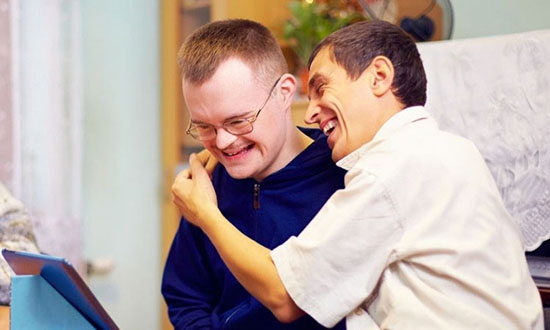I was thrown into becoming a carer as a teenager; my grandad was one of the 90,000 people in Scotland to be diagnosed with a form of dementia which meant he needed full time care. My parents at the time decided to keep him at home, but suddenly he went from being a huge bubbly outgoing personality to becoming withdrawn.
At times he also had spells of anger, frustration, suspicion, and forgiveness; in the end he became reliant on me for all personal care, and as a relative it was devastating to watch his illness deteriorate, losing more of him each day.
I always wondered what he might be feeling and thinking, hearing and seeing, so I made the choice to become a Care Assistant at Almont Court dementia unit later in life. The illness had such a profound effect on me early on in my life that I wanted to help and understand more about people with the same diagnosis.
There are many different types of dementia which affect each individual differently, I work with residents experiencing different stages and that alters my approach with each one.
Dealing with people with the disease as a whole has always given me thought as to how someone feels going through the various stages; what are they thinking and feeling, and how would someone else deal with the disease, even if only for a short time?
My interpretation of how a day in their life may be or could feel is described below;
To look in a mirror and not recognise the person looking back, would you believe with your eyes?
You’re a lot older now you’re hair has turned grey, from what you remember of your parents they looked this way,
You notice more wrinkles all over your face, close your eyes for a second and put yourself in their place,
Sons mistaken for husband’s, daughters mistaken for wives, how difficult it must be for them gradually losing parts of a parent they had all their lives,
Coming from a generation of hard working people who looked after their own, they cared for their partners, their kids and their home,
Everything was kept in order and maintained, until dementia affected all different parts of their brain,
Being woke by a person they perceive as a stranger, some residents are okay, but others can feel their in some sort of danger,
They hit out in fear and scream in your face, how do you think you would feel; put yourself in their place,
Some remember yesterday but have no memories of the years gone by, they have forgotten all the things most would remember, and sometimes family struggle to understand why,
Striped of all their memories they ask what part of their loved one is left behind, and that’s when I explain that our job is to be there, encouraging with things that help to remind,
To have a lifetime of experience and advice you can’t vocalise sitting there going round in your head, but because of your diagnoses you spend most of your time in bed,
I could only imagine not being able to communicate with people all day, how lonely it must be to live life this way,
Spending your time in a room; it’s such a small space, close your eyes for a second and put yourself in their place,
To be seated in a room, and to eat with lots of people you don’t know, some shouting and banging, so you make a fuss because you don’t want to go,
I try to ease the struggles our residents are faced with each day, and I try this in many different ways;
I support, I prompt, I listen, I talk, and if there’s a situation sometimes all it takes is a chat and a walk,
I do activities that help with their cognitive state; I keep track of their fluids, I make sure that they’ve ate,
I play games; from dominoes, connect4, cards, karaoke just to name a few, bingo the ladies like to shout out when they have won; I feel it helps them have a happier day when they have taken
part in some fun,
Each resident’s an individual and it’s crucial you treat them this way, it’s rewarding being a carer and knowing you have helped make a persons life less stressful and difficult each day,
We get told as carers to detach ourselves emotionally, but I’m sorry I struggle with that and I’m sure that can’t just be me,
Some residents we care for in a short period of time and others we care for year after year; regardless of how long we as carers hold each one dear,
So when you enter a room and wake someone and they look at you with a surprise, just take a step back and think for a second, what are they seeing with their eyes?
You pick out something for them to wear and assist them to wash, then you encourage them to put on their clothes and shoes and start tying their lace, they have just been through each step with a face they can’t place; so think about it really if it was you, would you choose to put yourself in their place?
Request more Information





